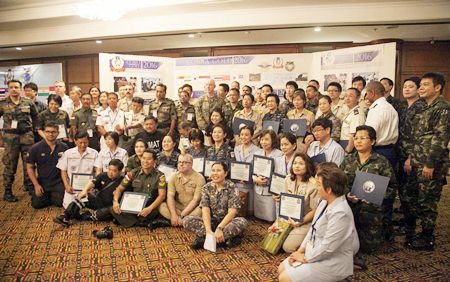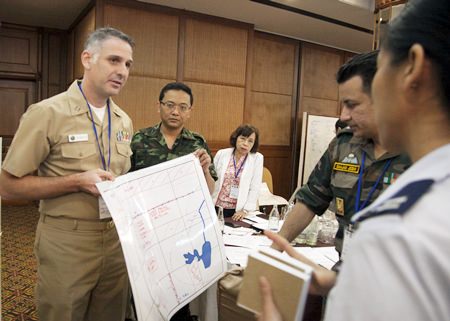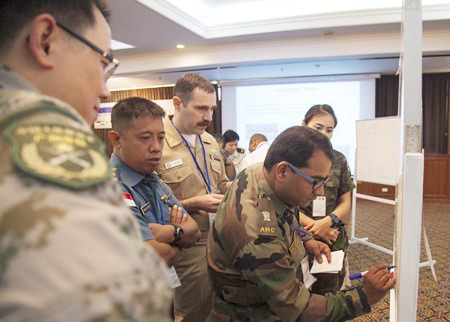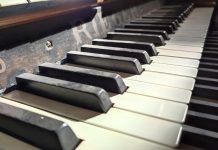Chanthaburi, Thailand – A multitude of Indo-Asian Pacific nations’ militaries and civilian organizations gathered during Exercise Cobra Gold 16 to share knowledge and techniques about humanitarian assistance disaster response during the Medical Symposium, Feb. 9 to Feb. 12, at the K.P. Grand Hotel, Chanthaburi, Thailand. The theme of the symposium was “Regional Public Health Response in a HADR Event.”
The main goal of the symposium was to raise the level of awareness, understanding, and methods for mitigation and prevention of new and emerging disease threats.
Different nations have different processes, but when we have a problem we will all work together and work as one to help people, said Lt. Cmdr. Sirisak Ekphisutsunthon, dentist with the Division of Medical Department, Royal Thai Navy.
 Members and participants of the Exercise Cobra Gold 16 Medical Symposium pose for one last group photo Feb. 12 at the K.P. Grand Hotel, Chanthaburi, Thailand.
Members and participants of the Exercise Cobra Gold 16 Medical Symposium pose for one last group photo Feb. 12 at the K.P. Grand Hotel, Chanthaburi, Thailand.
A few of the topics covered during the symposium were the U.S. HADR response, civil and military collaboration on the emergency medicine system and public health emergency management in HADR.
“Initially we wanted to learn from each other’s capabilities and also real-world situations that occurred with disasters with a focus of public health,” said Lt. Cmdr. Eugene Osborn, medical planner with III Marine Expeditionary Force.
The medical symposium consisted of lectures and presentations on the first day followed by two days of a table top exercise, and then closing out with a ceremony on the last day. For the table top exercise, the participants were broken up into teams and given a scenario to work through.
 Exercise Cobra Gold 16 Medical Symposium participants look at the layout of the medical camp they created during a humanitarian assistance disaster response table top exercise Feb. 11 at the K.P. Grand Hotel in Chanthaburi.
Exercise Cobra Gold 16 Medical Symposium participants look at the layout of the medical camp they created during a humanitarian assistance disaster response table top exercise Feb. 11 at the K.P. Grand Hotel in Chanthaburi.
“There’s lot of subject matter experts within the groups, and they’ve broken us up into small groups and the intention is to have these different countries, multi-nations, working together in these disaster situations and scenarios,” said Maj. Eric Grider, 18th Medical Command, U.S. Army Pacific. “I’ve always said that medicine is medicine, it doesn’t matter what uniform you wear so I think the use of these clinical providers and these planners from other countries can be vital to the Pacific Command,” said Grider.
Different nations spoke about their experiences with HADR to include members of the People’s Liberation Army, People’s Republic of China, and their brief on how they handled disasters in the region. After some of the briefs there was a question and answer period in which the nations shared their own experiences amongst the group.
 Participants of the Exercise Cobra Gold 16 Medical Symposium work through a humanitarian assistance disaster response scenario.
Participants of the Exercise Cobra Gold 16 Medical Symposium work through a humanitarian assistance disaster response scenario.
“The biggest lesson I draw from here, as Asian countries together, is the need for integration and we all, I think, need to collaborate. It’s a very good endeavor that the U.S. has taken the lead to put us all together under one umbrella,” said Lt. Col. Sameer Mehrotra, a faculty member with the Armed Forces Medical College, Indian Army. “This is just the beginning but we really need to move a long way ahead to ensure we are safe,” said Mehrotra.




